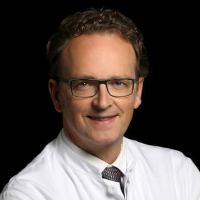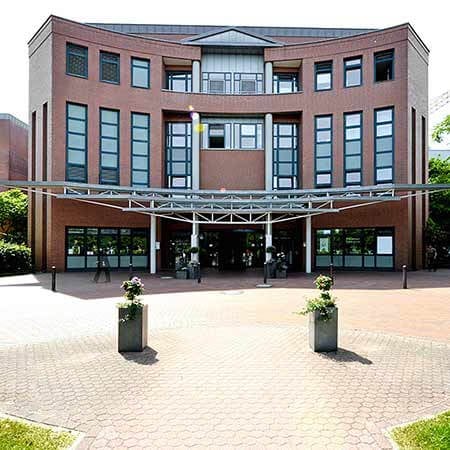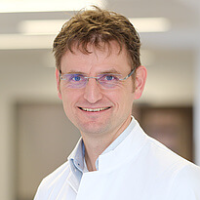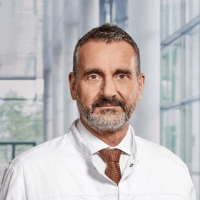Prosthetic (replacement) of mitral valve (minimally invasive) for mitral valve insufficiency (prolapse)
Treatment prices are regulated by national law of the corresponding countries, but can also include additional hospital coefficients. In order to receive the individual cost calculation, please send us the request and medical records.

Department of Cardiothoracic Surgery
According to the Focus magazine, the Department of Cardiothoracic Surgery ranks among the top German medical facilities specializing in the surgical treatment of diseases of the cardiovascular system and lung cancer! The department offers the full range of surgical services for the treatment of diseases of the cardiovascular system, respiratory tract, including heart and lung transplantation, artificial heart implantation. The therapeutic options include aortic surgery, coronary artery bypass grafting, transplantation surgery, surgical treatment of heart rhythm disorders (arrhythmias), minimally invasive surgery, surgical treatment of the heart valves, including reconstructive interventions. All operations are performed using state-of-the-art technology and in accordance with the current recommendations of professional societies.






Department of Cardiac Surgery
The Department of Cardiac Surgery provides a full range of surgical treatment in its area of specialization. Special emphasis is placed on heart valve repair and replacement surgery, coronary artery bypass grafting, thoracic aortic surgery, adult congenital and acquired heart disease surgery, pacemaker and defibrillator implantation, and artificial heart implantation for severe heart failure. Many heart operations are performed using minimally invasive techniques, which has a positive effect on the healing of the surgical wound. Minimally invasive cardiac procedures also reduce surgical risks and contribute to a rapid recovery of the patient in the postoperative period. Surgical treatment of cardiac pathologies is performed in advanced operating rooms equipped with the latest technology. The cardiac surgeons of the department successfully perform routine and complex surgical procedures, saving the lives of thousands of patients. The specialists work in accordance with current clinical protocols and follow the recommendations of the German Society for Thoracic and Cardiovascular Surgery (DGTHG).


Department of Cardiothoracic Surgery and Vascular Surgery
The Department of Cardiothoracic Surgery and Vascular Surgery provides effective surgical treatment for diseases of the heart, respiratory system, and blood vessels. The team of cardiac surgeons operates on patients with heart valve pathologies, coronary heart disease, heart failure, and heart rhythm disturbances. In the field of thoracic surgery, the key focus is on the surgical removal of lung tumors and lung metastases. The specialists in this area also perform surgery to repair chest wall deformities. In the field of vascular surgery, interventions for abdominal and thoracic aortic aneurysms are most often performed here. The department's vascular surgeons are also exceptionally competent in the treatment of peripheral occlusive arterial disease. A great advantage for the department's patients is that almost all surgical interventions are performed using minimally invasive techniques, so there is no need for a long postoperative recovery. The department's operating rooms are equipped with state-of-the-art technology. This allows for effective and safe treatment. The priority is always personalized medical care for patients.






If you were refused a mitral valve replacement or repair surgery due to advanced age and comorbidities, this is not a reason to give up. For several years now, minimally invasive mitral valve surgery has been performed abroad. The world's best cardiac surgeons perform not only mitral valve repair procedures but also the replacement of this heart valve with an artificial bioprosthesis through blood vessels or through a minimal chest incision.
This type of surgery is safer, provides patients with a relatively rapid health recovery, and is a good alternative for those who cannot have other treatments for mitral valve diseases. You can go abroad to undergo your minimally invasive (transcatheter) mitral valve replacement. You are welcome to use the Booking Health website to find out the cost of treatment, compare prices in different hospitals, and choose a medical care program.
Content
- Who may be a candidate for minimally invasive heart valve replacement to treat prolapse?
- How is TMVR surgery performed for mitral valve prolapse?
- Why to have your mitral valve prolapse treatment abroad?
Who may be a candidate for minimally invasive heart valve replacement to treat prolapse?
Open-heart surgery remains the main treatment for mitral regurgitation. Minimally invasive interventions are considered a promising, but still understudied, field in cardiac surgery. The technique can only be used when open-heart surgery is contraindicated.
However, cases where a patient needs heart surgery but is refused surgical intervention are common. Most patients with mitral defects are elderly patients with not only heart disease but also other health conditions. Due to the high risk of complications, open mitral valve replacement surgery is not performed in such patients.
Minimally invasive replacement surgery is a good alternative for those with comorbidities. Transcatheter mitral valve replacement (TMVR) is safer and does not require a long recovery time to restore health.
Initially, artificial aortic valves were used for this operation, which were implanted in the mitral position. Today, dozens of artificial mitral valves have been developed for treating the disease using the TMVR technique. Although most of them are still in clinical trials, some are already being used in practice.
TMVR for mitral valve prolapse can thus be performed in the following cases:
- a person has severe regurgitation that necessitates a surgical intervention;
- a surgical procedure cannot be performed due to the high risk of complications and death;
- a transcatheter repair cannot be performed due to inappropriate heart valve anatomy (this minimally invasive procedure is only suitable for a limited number of patients).
Furthermore, transcatheter mitral valve implantation is performed during revision therapy following previous mitral valve repair or replacement. It is easier and more reliable to implant an artificial valve using a percutaneous (minimally invasive) technique inside a previously implanted prosthesis or inside a ring that was implanted in a patient during heart valve repair using an annuloplasty (this is a method of restoring the normal diameter of the mitral valve opening by implanting an artificial support ring).
How is TMVR surgery performed for mitral valve prolapse?
TMVR can be performed using either a transapical (through the apex of the heart) or a transseptal (through the septum of the heart) approach.
In any case, preparation is required before the operation. Patients undergo not only conventional transthoracic echocardiography but also transesophageal echocardiography, as well as computed tomography or magnetic resonance scans. With the help of these tests, doctors can accurately determine the mechanism of development and severity of mitral valve insufficiency and measure the mitral ring, the left ventricular outflow tract, the thickness of the myocardium at the apex of the heart, and the septum between the atria.
Transapical TMVR is performed under general anesthesia in a hybrid operating room. It is performed under the guidance of 3D transesophageal echocardiography and fluoroscopy. Doctors perform a mini-thoracotomy, that is, a small chest incision. In this case, the heart is not dissected. A needle is inserted into the left ventricle through the apex of the heart, and an artificial valve delivery system is inserted through it under conditions of high-frequency ventricular stimulation.
Transseptal TMVR is more complex and is performed through an incision in the groin. Doctors puncture the femoral artery and vein. An artificial heart valve is inserted into the heart through the blood vessels. Cardiac surgeons make an incision in the septum between the atria to deliver and place the device. Subsequently, the opening is closed with an occluder, which is commonly used to repair an atrial septal defect.
Why to have your mitral valve prolapse treatment abroad?
The world's experience with minimally invasive replacement for mitral valve insufficiency is limited. This operation is performed less frequently as compared to mitral valve repair. While transcatheter repair is carried out almost worldwide, only a small number of specialized centers in developed countries offer transcatheter replacement surgery.
Minimally invasive valve replacement abroad has the following benefits:
- modern devices for transcatheter implantation are used, which are more reliable and safe;
- doctors at specialized centers have vast experience in performing this new type of minimally invasive surgery;
- preference is given to a transseptal approach, which is less traumatic because recovery takes less time after such an operation;
- use of cutting-edge diagnostic equipment in the Departments of Radiosurgery and hybrid operating rooms allows doctors to fully control the procedure, lowering the risk of failed minimally invasive surgery;
- with the help of a minimally invasive method, cardiac surgeons abroad can perform not only the primary mitral valve replacement but also implant bioprostheses inside the ring after a previously performed annuloplasty, as well as inside the bioprosthesis if the patient has already had mitral valve replacement surgery;
- high-quality care and full recovery of patients after operations and procedures.
The operation results in the restoration of normal hemodynamics. A patient gets rid of the symptoms of prolapse. The load on the heart decreases, the risk of developing heart failure therefore decreases, and life expectancy increases.
You are welcome to use the Booking Health service to undergo your treatment abroad and recover from a heart disease. On our website, you can find out the cost of treatment abroad and choose a treatment and rehabilitation program for your preferred dates. When you make your appointment through Booking Health, the cost of treatment and rehabilitation will be lower than when you contact the hospital directly. The price will be reduced due to the lack of high taxes for foreign patients.
When you make an appointment at the hospital through Booking Health, you will receive insurance against unforeseen medical expenses. This means that the initial cost of treatment will not increase even if additional procedures are required.
The Booking Health specialists will handle all of the arrangements for your trip abroad for disease treatment and recovery after surgery. We will contact the hospital administration, resolve all organizational issues, translate your medical documents, and book a hotel room and airline tickets. Our company's employees will meet you at the airport and take you to the hospital by car. After the completion of your treatment and recovery, a return transfer will be organized.
Authors:
The article was edited by medical experts, board-certified doctors Dr. Nadezhda Ivanisova and Dr. Vadim Zhiliuk. For the treatment of the conditions referred to in the article, you must consult a doctor; the information in the article is not intended for self-medication!
Sources:
ECR - European Cardiology Review

